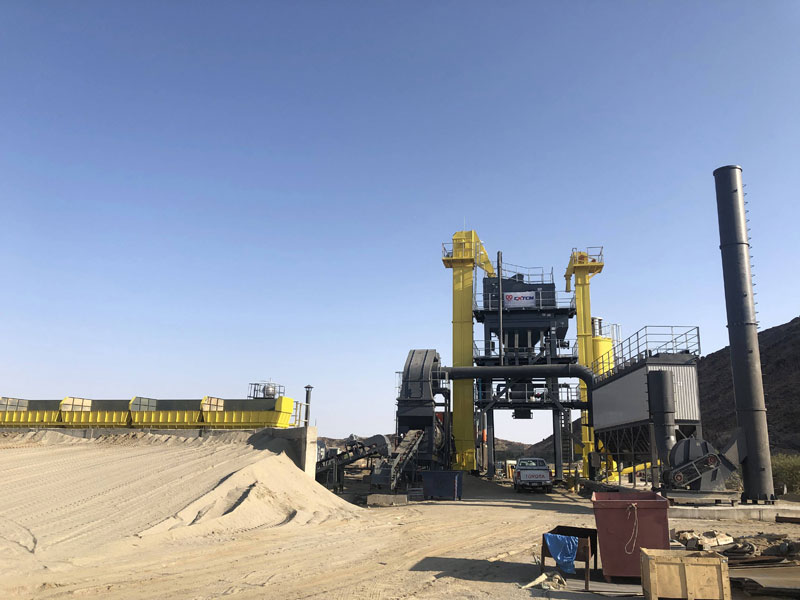Why Is an Asphalt Mixing Plant Crucial for Road Construction Projects?
2025-01-07
When it comes to building durable and high-quality roads, the importance of the materials used cannot be overstated. One of the most essential components in road construction is asphalt, a material that provides the strength, flexibility, and longevity needed for smooth, resilient road surfaces. To produce this high-quality asphalt, a specialized machine called an asphalt mixing plant plays a key role. But why exactly is an asphalt mixing plant so crucial for road construction projects? In this blog, we’ll explore the function of asphalt mixing plants, how they work, and why they are indispensable to modern infrastructure development.
What Is an Asphalt Mixing Plant?
An asphalt mixing plant is an industrial facility used for the production of asphalt concrete. This plant combines various materials, including bitumen (the primary binder), aggregates (such as sand, gravel, or crushed stone), and additives to create asphalt that is then used in road construction, highway paving, and other infrastructure projects.
Asphalt mixing plants come in different types, depending on the scale of the operation and the specific requirements of the project. These plants can be either stationary or mobile, and they vary in terms of production capacity, mixing method, and automation.
Why Is an Asphalt Mixing Plant Important for Road Construction?
1. High-Quality Asphalt Production:
The primary function of an asphalt mixing plant is to produce asphalt that meets the stringent quality requirements for road construction. The plant ensures that the mixture has the correct proportion of bitumen and aggregates, along with the right temperature, to create durable and long-lasting asphalt. Consistency in the mix is critical for ensuring that the finished road has the desired strength, flexibility, and resistance to wear and tear.
2. Efficient Production Process:
Asphalt mixing plants are designed to produce asphalt in large quantities, making them highly efficient for road construction projects that require significant amounts of asphalt. Whether you're paving a few kilometers of road or constructing extensive highways, the plant can quickly and reliably supply the required amount of asphalt, ensuring that the project stays on schedule.
3. Control Over Asphalt Mix Properties:
Asphalt quality is heavily dependent on the mix design—the exact proportions of bitumen, aggregates, and other additives. Asphalt mixing plants allow precise control over the mix design, ensuring that the final product meets the specific performance requirements for different road conditions, including load-bearing capacity, resistance to moisture, and temperature stability.
4. Customizable for Different Projects:
Different construction projects require different types of asphalt, based on factors like traffic volume, climate, and the type of road being built. Asphalt mixing plants can be configured to produce various asphalt grades and mixtures, making them adaptable for a wide range of road construction projects. Whether it's a high-traffic freeway or a rural road, the plant can produce the asphalt needed for optimal performance.
5. Environmentally Friendly Production:
Modern asphalt mixing plants are designed to minimize environmental impact. They use advanced technologies to reduce emissions, conserve energy, and recycle materials. For example, many plants feature recycling systems that allow the reuse of old asphalt (RAP, or Reclaimed Asphalt Pavement), reducing the need for virgin materials and minimizing waste. This contributes to more sustainable construction practices.
6. Precision and Automation:
Asphalt mixing plants have evolved to include automated systems that monitor and adjust various parameters, such as temperature, mixing time, and material proportions. This automation ensures that the asphalt mix is consistently high quality, reducing the chances of human error and improving overall efficiency. The precise control also helps optimize the use of materials, saving both time and money.
7. Scalability for Large Projects:
For large-scale infrastructure projects, such as highways or expressways, asphalt mixing plants offer the scalability required to meet high demand. These plants can produce thousands of tons of asphalt per day, ensuring that large projects progress without delays due to material shortages.
How Does an Asphalt Mixing Plant Work?
The process of asphalt production involves several steps, which are carefully controlled to ensure that the end product is of the highest quality. Here's a general overview of how an asphalt mixing plant works:
1. Material Handling:
Raw materials, such as aggregates, bitumen, and additives, are stored and transported to the plant. Aggregates are typically stored in bins or hoppers, while bitumen is kept in heated tanks to maintain its liquid form.
2. Heating and Drying:
The aggregates are first heated and dried in a drum dryer or rotary dryer to remove moisture. This is a crucial step, as excess moisture can affect the asphalt mix's quality and adhesion.
3. Mixing Process:
The dried aggregates are then mixed with hot bitumen and any other additives in the mixing unit (either a drum mixer or a batch mixer). The hot bitumen binds the aggregates together, creating a smooth, cohesive asphalt mixture. In batch-type plants, the mixing is done in separate batches, while in continuous plants, the mixing process is continuous.
4. Storage and Transport:
After the mixing process, the asphalt is stored in silos to keep it at the optimal temperature until it’s ready for use. From there, it can be transported to the construction site using trucks, where it is laid down by paving machines.
5. Quality Control:
Throughout the process, quality control is maintained to ensure that the asphalt meets the required specifications. Temperature, mix consistency, and material proportions are constantly monitored, and adjustments are made to ensure a high-quality product.
Types of Asphalt Mixing Plants
There are primarily two types of asphalt mixing plants used in road construction: batch plants and continuous plants.
1. Batch Asphalt Mixing Plants:
These plants produce asphalt in batches. The materials are mixed and heated in specific quantities, and the asphalt is produced one batch at a time. Batch plants are ideal for projects that require different types of asphalt or when precise control over the mix design is needed.
2. Continuous Asphalt Mixing Plants:
As the name suggests, continuous asphalt mixing plants produce asphalt in a continuous, uninterrupted process. These plants are typically used for large-scale projects where a high volume of asphalt is needed, as they can maintain a steady supply of asphalt without the delays that come with batch processing.
What Are the Key Benefits of Using an Asphalt Mixing Plant?
1. Speed and Efficiency:
Asphalt mixing plants can produce large amounts of asphalt quickly, allowing for faster project completion. The continuous production process ensures that there is always a fresh supply of asphalt ready for use.
2. Consistent Quality:
Automated systems and precise control over the mixing process ensure that the asphalt produced is consistent in quality, which is critical for road durability and performance.
3. Reduced Waste:
Many modern plants are equipped with recycling systems that allow for the reuse of old asphalt, minimizing waste and reducing the need for new materials.
4. Adaptability:
Asphalt mixing plants can be customized to produce different asphalt mixtures for various project requirements, from highways to urban roads, making them versatile for all kinds of construction needs.
Conclusion: The Backbone of Road Construction
In conclusion, an asphalt mixing plant is an indispensable piece of equipment for any large-scale road construction project. It ensures the production of high-quality asphalt, improves the efficiency of the construction process, and contributes to sustainable construction practices. Whether for a small rural road or a vast highway network, asphalt mixing plants provide the reliable, high-performance materials needed to build the roads we travel on every day. So, the next time you drive along a smooth, durable road, you can thank the asphalt mixing plant that made it possible.



